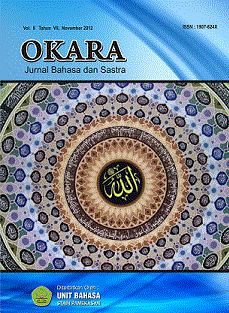NAHWU DALAM PENERJEMAHAN ARAB-MADURA (Studi Kritis atas Safinatun Najâ Genre Prosa dan Puisi/Nadzaman)
 Abstract views: 150
,
Abstract views: 150
,
 Untitled downloads: 1008
Untitled downloads: 1008
Abstract
الترجمة هي علامة تقدم الحضارة الإنسانية بشرط أن لا تحجب اللغة المترجمة
منها منزلة اللغة المترجمة إليها. الترجمة من اللغة العربية إلى اللغة المادورية فى ولاية
التطبيق جعلت اللغة المادورية خاضعة إلى قاعدة اللغة المترجمة منها حتى كانت
نتيجة الترجمة لا يفهمها القارئ قائمة بنفسها من غير وجود النص الأصلى.
فلهذا الطراز من الترجمة الجوانب الإيجابية والسلبية وأراد الكاتب بحثها بالمطالعة
النقدية لكتاب سفينة النجا المادوري نثرا ونظما.
منها منزلة اللغة المترجمة إليها. الترجمة من اللغة العربية إلى اللغة المادورية فى ولاية
التطبيق جعلت اللغة المادورية خاضعة إلى قاعدة اللغة المترجمة منها حتى كانت
نتيجة الترجمة لا يفهمها القارئ قائمة بنفسها من غير وجود النص الأصلى.
فلهذا الطراز من الترجمة الجوانب الإيجابية والسلبية وأراد الكاتب بحثها بالمطالعة
النقدية لكتاب سفينة النجا المادوري نثرا ونظما.
Downloads
Download data is not yet available.
Published
2017-08-04
How to Cite
Bukhory, U. (2017). NAHWU DALAM PENERJEMAHAN ARAB-MADURA (Studi Kritis atas Safinatun Najâ Genre Prosa dan Puisi/Nadzaman). OKARA: Jurnal Bahasa Dan Sastra, 6(2). https://doi.org/10.19105/ojbs.v6i2.428
Section
Articles
The journal operates an Open Access policy under a Creative Commons Attribution-NonCommercial 4.0 International License. Authors who publish with this journal agree to the following terms:
- Authors retain copyright and grant the journal right of first publication with the work simultaneously licensed under a Creative Commons Attribution License that allows others to share the work with an acknowledgement of the work's authorship and initial publication in this journal.
- Authors are able to enter into separate, additional contractual arrangements for the non-exclusive distribution of the journal's published version of the work (e.g., post it to an institutional repository or publish it in a book), with an acknowledgement of its initial publication in this journal.
- Authors are permitted and encouraged to post their work online (e.g., in institutional repositories or on their website) prior to and during the submission process, as it can lead to productive exchanges, as well as earlier and greater citation of published work.





_(1).png)
.png)
.png)
1.png)
.png)
.png)

.png)
_-_Copy_-_Copy.png)





